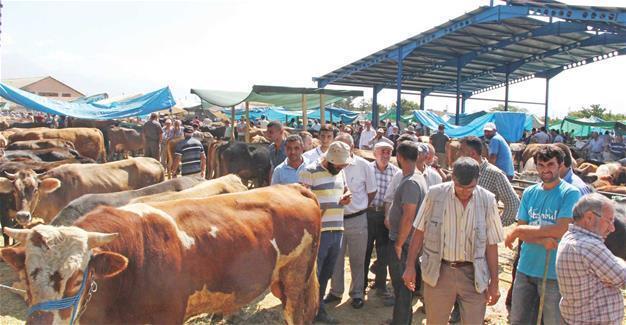World’s Muslims celebrate ‘Feast of Sacrifice’
ISTANBUL

Muslims worldwide, including those in Turkey, are celebrating Islam’s holy “Feast of Sacrifice”—known as Eid al-Adha in Arabic—with millions of Muslims around the world making a pilgrimage this week to Saudi Arabia.
The four-day celebration began on Sept. 1 in Turkey and most other countries with a predominantly Muslim population.
Large numbers of sacrificial animals including sheep, cows, goats and camels, will be killed as part of the Feast of Sacrifice and their meat will be distributed to the poor as a religious tradition in Islam.
This year, the Turkish cabinet agreed to extend the nine-day public holiday to 10 days starting from Aug. 28 and ending on Sept. 4, announced Deputy Prime Minister Bekir Bozdağ on Aug. 15, who spoke after a cabinet meeting chaired by President Recep Tayyip Erdoğan.
The decision was made in the context of “helping family visits, reviving the tourism sector and having a positive effect on commerce,” Bozdağ told reporters.
While most Turkish Muslims make good on their religious duties by sacrificing livestock and distributing the meat to the poor, a considerably large number of them prefer instead to spend their time off during the holiday vacationing.
Hundreds of thousands of Turks traditionally travel to their hometowns to spend time with their families during the holiday, which has seen increased traffic accidents across the country in recent years due to mass traveling.
The 10-day holiday has also made Turkish hoteliers happy in tourism season.
Meanwhile, the annual hajj pilgrimage reached its climax when Muslims from across the world swarmed a stoney hill in western Saudi Arabia to pray and recite from the Quran.
More than 1.8 million gathered from sunrise at the hill and a vast surrounding plain known as Mount Arafat, about 15 kilometers from Mecca.
Against a backdrop of distant, higher peaks, they squatted, stood, or climbed steps built into the hill while reciting ritual incantations.
From a distance, the hill appeared a snowy white, as male pilgrims wear a seamless two-piece white garment known as an ihram, which symbolizes a state of purity and emphasizes their unity regardless of social status or nationality.
Islam requires all able-bodied Muslims to perform the hajj at least once. The pilgrimage is among the five main pillars of Islam, which also includes belief in the oneness of God and the Prophet Muhammad as his final messenger, five daily prayers facing toward the Kaaba, annual charity and fasting during the month of Ramadan.
The pilgrimage requires money, physical perseverance and a coveted hajj visa. Saudi Arabia has strict quotas for each country to manage crowd safety.
In the Islamic faith, the Feast of Sacrifice, on the other hand, is celebrated to commemorate the Prophet Abraham’s willingness to sacrifice his son Ismail—the Biblical Ishmael, though Christians and Jews believe his other son Isaac was the near-sacrifice—as a test of his faith in God.
In remembrance, Muslims worldwide sacrifice sheep and other livestock and give their meat to the poor.
 Muslims worldwide, including those in Turkey, are celebrating Islam’s holy “Feast of Sacrifice”—known as Eid al-Adha in Arabic—with millions of Muslims around the world making a pilgrimage this week to Saudi Arabia.
Muslims worldwide, including those in Turkey, are celebrating Islam’s holy “Feast of Sacrifice”—known as Eid al-Adha in Arabic—with millions of Muslims around the world making a pilgrimage this week to Saudi Arabia.